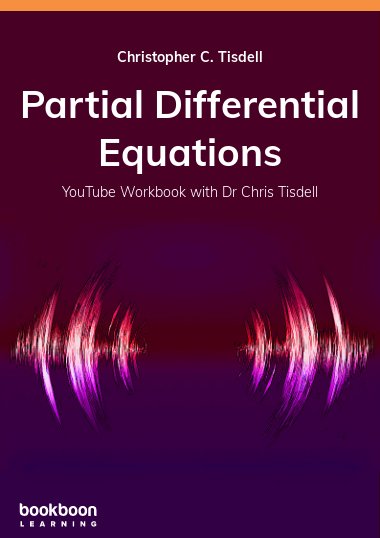Partial differential equations form tools for modelling,
predicting and understanding our world. Scientists and engineers use them in
the analysis of advanced problems. In this eBook, award-winning educator
Dr Chris Tisdell demystifies these advanced equations. Highlights of this
eBook include: an integration of the lessons with YouTube videos; and the
design of active learning spaces. By engaging with this eBook, its examples
and Chris's YouTube videos, you'll be well-placed to better understand partial
differential equations and their solutions techniques. Download now!
About the author
“With more than a million YouTube hits, Dr Chris Tisdell is the equivalent of a best-selling author or chart-topping musician. And the unlikely subject of this mass popularity? University mathematics.” [Sydney Morning Herald, 14/6/2012].
Chris Tisdell has been inspiring, motivating and engaging large mathematics classes at UNSW, Sydney for over a decade. His lectures are performance-like, with emphasis on contextualisation, clarity in presentation and a strong connection between student and teacher.
He blends the live experience with out-of-class learning, underpinned by flexibility, sharing and openness. Enabling this has been his creation, freely sharing and management of future-oriented online learning resources, known as Open Educational Resources (OER). They are designed to empower learners by granting them unlimited access to knowledge at a time, location and pace that suits their needs. This includes: hundreds of YouTube educational videos of his lectures and tutorials; an etextbook with each section strategically linked with his online videos; and live interactive classes streamed over the internet.
His approach has changed the way students learn mathematics, moving from a traditional closed classroom environment to an open, flexible and forward-looking learning model.
Indicators of esteem include: a prestigious educational partnership with Google; an etextbook with over 500,000 unique downloads; mathematics videos enjoying millions of hits from over 200 countries; a UNSW Vice-Chancellor’s Award for Teaching Excellence; and 100% student satisfaction rating in teaching surveys across 15 different courses at UNSW over eight years.
Chris has been an educational consultant to The Australian Broadcasting Corporation and has advised the Chief Scientist of Australia on educational policy.

